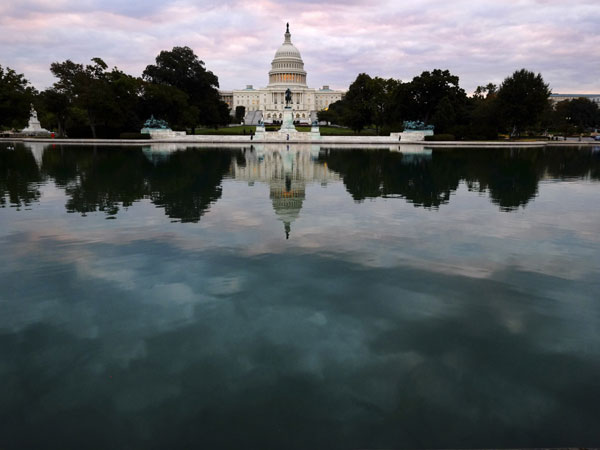
The Capitol is mirrored in the Capitol Reflecting Pool on Capitol Hill in Washington early Tuesday, Oct. 1, 2013. Congress plunged the nation into a partial government shutdown Tuesday as a long-running dispute over President Barack Obama’s health care law stalled a temporary funding bill, forcing about 800,000 federal workers off the job and suspending most non-essential federal programs and services. AP
WASHINGTON—The first US government shutdown in nearly two decades put a choke hold on Washington Tuesday, as the White House and Republicans dug in for an extended struggle with no way out in sight.
National monuments were barricaded, US war cemeteries in Europe closed, and hundreds of thousands of federal workers sent home without pay, after dawn revealed the wreckage of America’s latest paralyzing political crisis.
President Barack Obama accused conservatives in the House of Representatives of waging an “ideological crusade” by making government funding conditional on gutting his health reform law.
His top foe, Speaker John Boehner, meanwhile, claimed Obama was pursuing a “scorched earth” policy by refusing to negotiate with Republicans, as the rhetoric hit new heights and hopes for a swift end to the standoff faded.
The president was in feisty form at a White House event marking the rollout of a key portion of Obamacare, which turned into an extended taunt at Republicans for failing to halt implementation of the sweeping law.
“This Republican shutdown did not have to happen—I want every American to understand why it did happen,” Obama said.
“They have shut down the government over an ideological crusade to deny affordable healthcare to millions of Americans.”
It was the morning after on Capitol Hill, where late-night brinkmanship Monday sent America into its first government shutdown in 17 years when the money ran out at midnight.
Boehner, who effectively chose to side with the uproarious Tea Party faction of his party rather than risk his job by attempting to pass a straight funding resolution stripped of political poison pills, lit into the president.
“Washington Democrats have slammed the door on reopening the government by refusing to engage in bipartisan talks,” he wrote in an opinion piece in USA Today.
“This is part of a larger pattern: the president’s scorched-Earth policy of refusing to negotiate in bipartisan way on his health care law, current government funding, or the debt limit.”
So far at least, Boehner was dancing on the trickiest political ground.
72% oppose shutdown
A Quinnipiac University poll found voters oppose the shutdown of the government as a way to derail Obamacare by a margin of 72 percent to 22 percent.
The New York Daily News tabloid had a more blunt summation: “House of Turds” its front page read, in a swipe at Republicans modeled on the hit Netflix political mini-series “House of Cards.”
Thousands of Federal workers trekked into town only to clear their desks and to be told they were not “essential” to the running of the US government machine.
Young aides trooped out of the White House, leaving Obama with only a skeleton crew on hand.
Perplexed tourists were turned away from monuments and museums on the National Mall secured behind barriers and tape reading “Police Line: Do not Cross.”
But one hardy group was made of sterner stuff—an aging band of the so-called Greatest Generation showed up at the World War II memorial and refused to be denied entry.
Those visiting their dead comrades in France, Belgium, Italy and elsewhere were turned away, as funding dried up for American cemeteries in 20 corners of foreign fields.
Another symbol of hard won freedoms—The Statue of Liberty in New York—was off limits to disappointed tourists.
“The Statue of Liberty is such a strong symbol for so many people. It is America, it symbolizes freedom, jobs, a government you can trust,” said Bea Mueller, left in tears after she traveled from Seattle to tour the monument, only to find it closed.
Other government-funded bodies seen as doing urgent work, like the military and border patrol, were kept at full strength, but the Pentagon was due to stand down almost half of its 800,000 civilian employees.
Under the serene Capitol Dome, warring lawmakers, exhausted by the political theatrics of Monday night, stirred as the shutdown moved into its 18th hour.
Early hopes proved premature
But early hopes that a compromise would emerge once the shock of the shutdown had hit proved premature.
Republicans in the House and Senate geared up for an effort to pass small bills funding popular parts of the government, including Veterans benefits and museums.
The plan appeared to be an attempt to shame Democrats who say they will not negotiate with “a gun to their head” with the government closed.
“That proposal shows the utter lack of seriousness that we’re seeing from Republicans,” said White House spokesman Jay Carney.
Democratic Senate Majority leader Harry Reid added: “We won’t be forced to choose between parks and cancer research… or the FBI.”
Democratic tactics were designed to thwart every Republican attempt for a facing saving exit and to force an eventual climbdown from Boehner.
Obama warned that the shutdown could have disastrous consequences for the sluggish economic recovery.
“We may not know the full impact of this Republican shutdown for some time,” he said.
“We know that the last time Republicans shut down the government in 1996, it hurt our economy. And unlike 1996, our economy is still recovering from the worst recession in generations.”
To press his case, Obama was due to meet CEOs of some top Wall Street firms at the White House on Wednesday.—Michael Mathes, Stephen Collinson